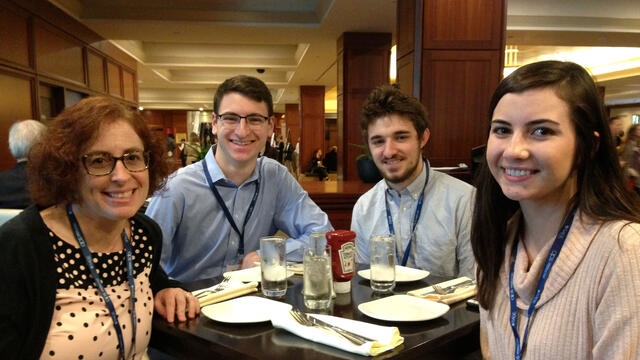Psychology student presents groundbreaking research at national conference
Last fall, during Katie Keegan’s senior year, the Psychology major’s curiosity sparked an Honors research study about perceptions of mass murder committed by Muslims versus Christians and landed her a presentation spot at a national conference.

Psychology student Katie Keegan presented groundbreaking research at a psychology conference. Matt Allen and Max Seigel also presented and Psychology professor Wendy Morris advised.
Last fall, during Katie Keegan’s senior year, the Psychology major’s curiosity sparked an Honors research study about perceptions of mass murder committed by Muslims versus Christians and landed her a presentation spot at a national conference.
Keegan thought she saw a trend in headlines of stories reporting attempts and actual mass murders. If the perpetrator had a Christian-sounding name, the media seemed to portray them as mentally ill. If the perpetrator had a Muslim-sounding name, the media portrayed them as possible terrorists.
Existing research focuses on Muslim perpetrators, Keegan says. Studies have shown Muslim perpetrators are more often referred to as terrorists than their Judeo-Christian counterparts, the term “Islam” is associated with “terrorism” and perpetrators who commit crimes perceived as stereotypic of their group receive harsher punishments.
But Keegan, who completed an internship and now works with the U.S. Customs and Border Protection division of Homeland Security, found no existing research that looked at Christian perpetrators.
Funded by a McDaniel Research and Creativity Grant, she decided to try to decode the differences. With support from her research advisor, Psychology professor Wendy Morris, she designed an experiment that extended current research into new territory by looking at how, in nearly identical situations, Christian perpetrators were seen as mentally unstable instead of terrorists.
“The research is groundbreaking — I haven’t seen anything quite like it,” says Morris. “A lot of people have associated the perceptions of Muslims with terrorism but there isn’t much out there about associating Christians with mental illness for the same or similar crimes.”
Yet that’s exactly what Keegan’s study showed — when perceptions of Muslim and Christian perpetrators of mass murder were compared, the same crime was perceived differently based upon the religion of the perpetrator. Muslims were more likely to be viewed as terrorists while Christians were more likely to be viewed as mentally unstable.
Keegan’s conclusions were based on a group of 320 college students who read a mock news story about a mass murder in which three independent variables were manipulated: perpetrator’s religion, weapon used and U.S. citizenship status. Just days after her May graduation from McDaniel, she was in Boston sharing her research, “Mass Murder in the News: How Religion Influences Perception of Terrorism and Mental Illness,” with professionals in her field at the Association for Psychological Science conference.
“It was an amazing opportunity to showcase to a wide variety of people my research about perceptions of terrorism, and students and professors alike were interested to hear how I landed upon the topic I did and my next steps in my career and schooling,” says Keegan of Hadley, Mass. “My conference section featured research that was related to the study of fear and many of us utilized similar background research about terror and terrorism.
“It was inspiring to see others pursuing the topic of terrorism from a psychological standpoint as I did.”
Also at the conference, juniors Matt Allen of Rockville, Md., and Max Seigel of Potomac, Md., presented, “Using Blind Grading to Prevent the Effect of Stereotype Threat on Women in Math,” the student-faculty research collaboration they conducted with Morris and junior Khadijah Poston of Columbia, Md.
Morris explained that the group found that when students know that their tests will be graded blindly, men and women performed equally well on a math test.
“However, when they are told their tests will not be graded blindly, then we see the typical achievement gap where women perform worse than men on math tests,” Morris says. “This finding only occurred when the test was called a ‘math test’ because math is a domain in which women are stereotyped to do poorly. When the same test was called a ‘creative thinking test,’ women always performed just as well as men, regardless of whether they were told the test would be graded blindly or not.
“The improvement in the women's math performance was due to the students' expectation that their tests would be graded blindly, not due to blind grading itself because, in reality, all of the tests were graded blindly.”
Morris has always graded tests blindly, but learned from this study that making students aware that the tests will be graded blindly can minimize gender achievement gaps on math tests.
At the conference, Morris beamed with pride as she watched her students present their work.
“I was impressed and proud of how Katie, Matt and Max presented their research so knowledgeably and professionally right alongside other presenters who were graduate students and professors,” she says.
McDaniel Psychology professor Wendy Morris (left) with students Matt Allen, Max Seigel and Katie Keegan at the Association for Psychological Science conference in Boston.